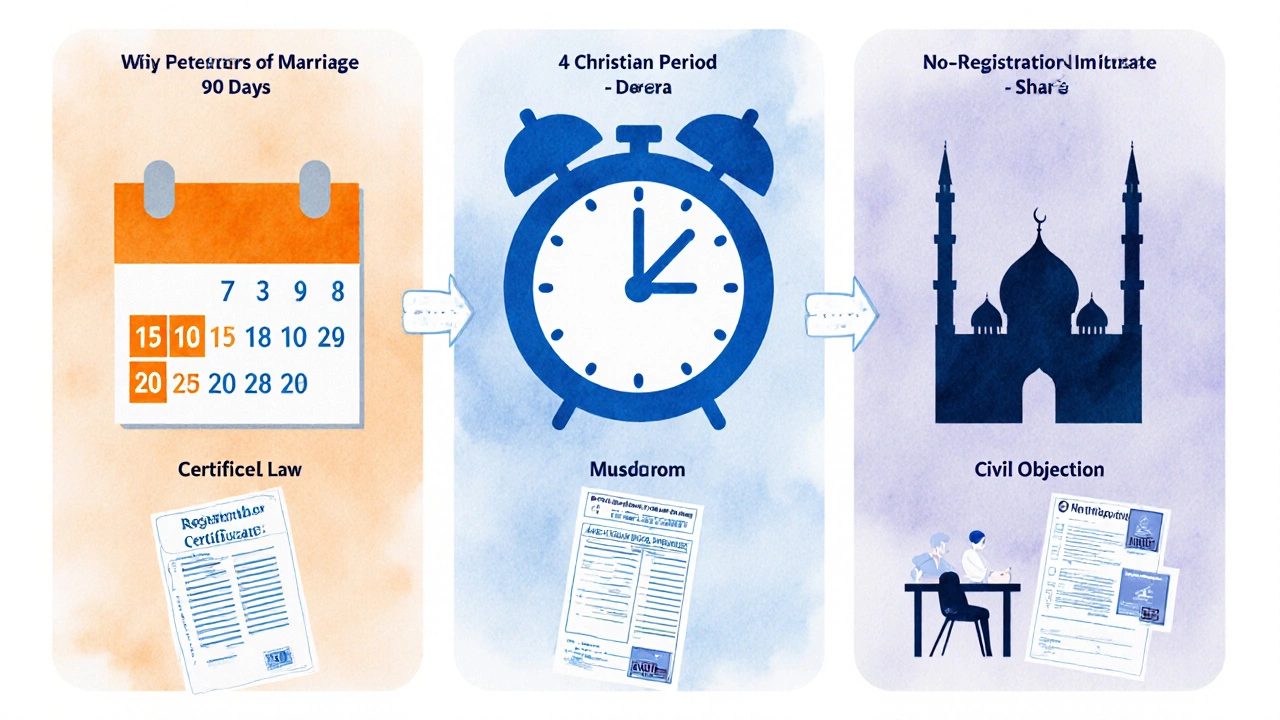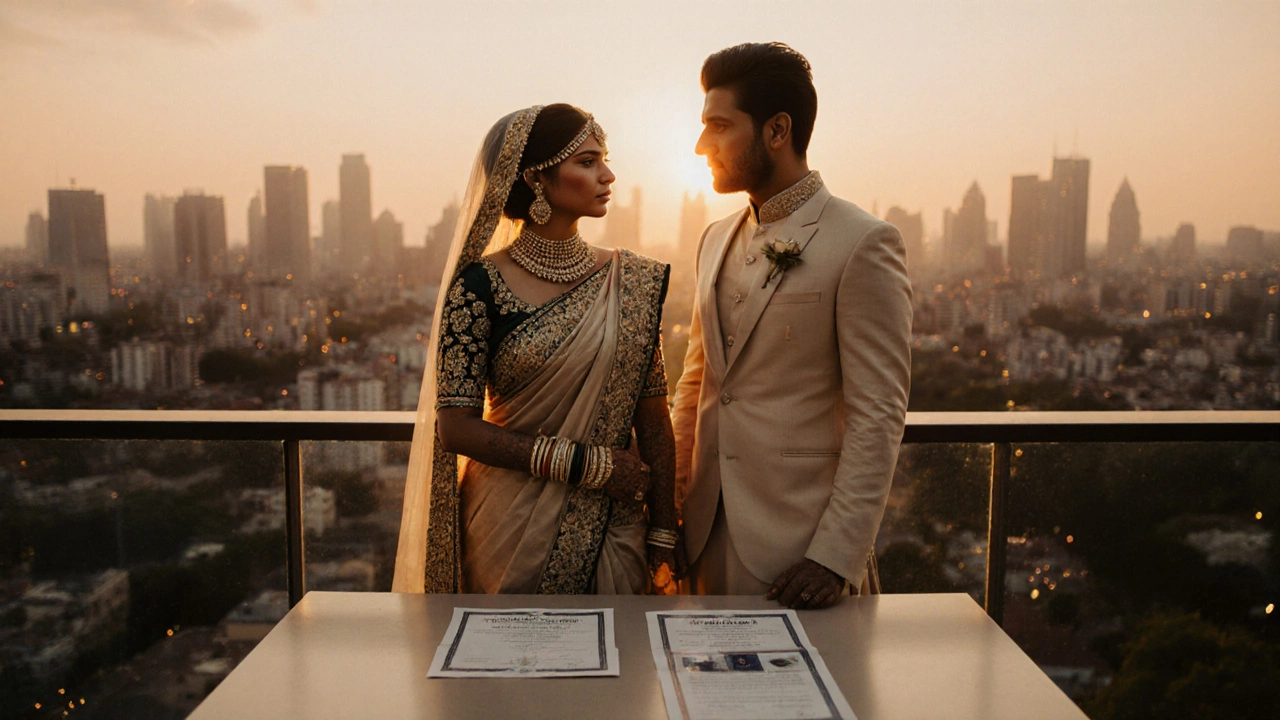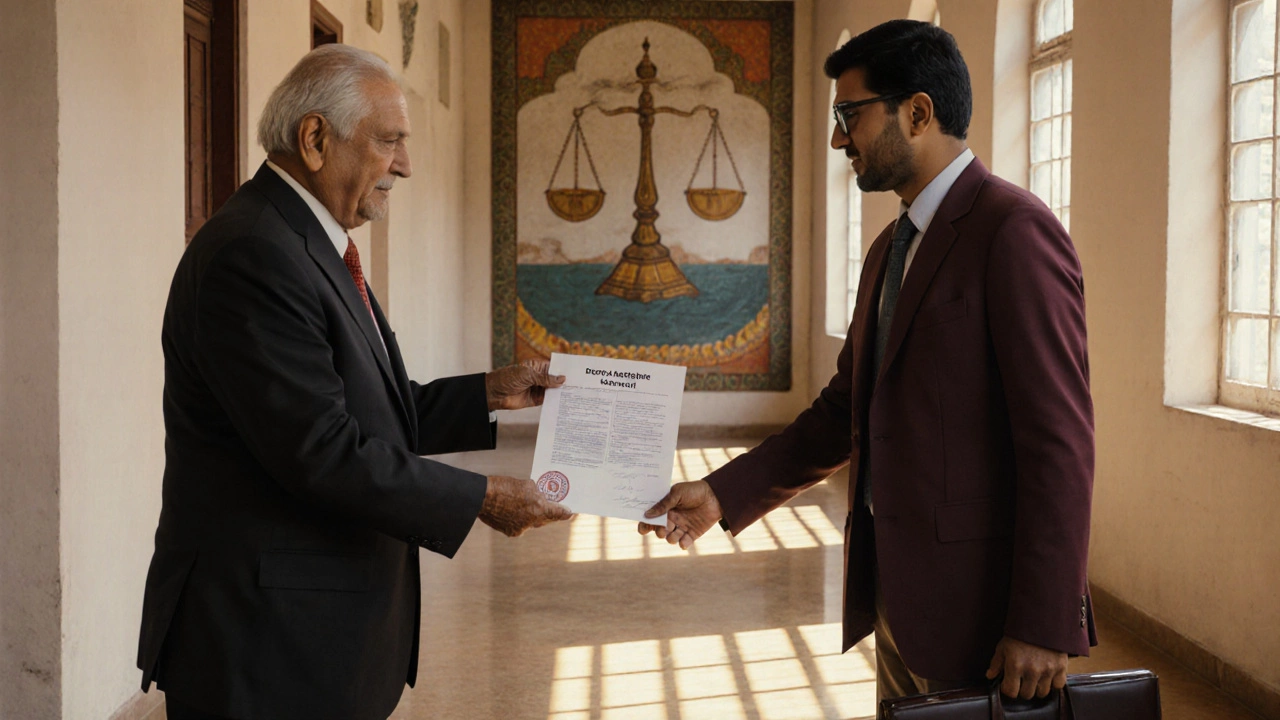When a marriage ends in India, the big question that follows is whether you can remarry after divorce India and what hoops you need to jump through. The answer isn’t a one‑size‑fits‑all; it depends on the personal law that governed your first marriage, the type of divorce decree you have, and a few statutory waiting periods. Below we break down the key rules, the steps you’ll need to take, and common pitfalls to avoid so you can move forward with confidence.
Key Takeaways
- All Indian personal laws allow remarriage once the divorce decree becomes final ("decree absolute").
- Hindu, Sikh, Buddhist and Jain couples must wait 90 days after the decree; Christians, Parsis and Muslims have no mandatory waiting period, though registration requirements differ.
- You need a certified copy of the decree, a No‑Objection Certificate (if applicable), and proper registration with the local Registrar of Marriages.
- Failure to follow the legal process can invalidate the new marriage and expose you to criminal charges for bigamy.
- Seek legal advice early to ensure paperwork is in order and to understand any religion‑specific nuances.
Understanding the Legal Landscape
Remarriage after divorce in India is governed by a patchwork of personal laws and statutes. The most common frameworks are:
- Hindu Marriage Act, 1955 - applies to Hindus, Sikhs, Buddhists and Jains.
- Special Marriage Act, 1954 - for inter‑faith couples or those opting for a civil marriage.
- Indian Divorce Act, 1869 - governs Christian marriages.
- Parsi Marriage and Divorce Act, 1936 - for the Parsi community.
- Muslim Personal Law (Sharia) - varies by sect but generally permits remarriage after a valid talaq or khula.
All these statutes share a common requirement: the previous marriage must be legally dissolved through a "decree absolute" (final divorce order). A decree nisi (the interim order) is not enough.
Step‑by‑Step Guide to Remarrying Legally
- Obtain the Decree Absolute - Ensure the court has issued the final order. This is the legal proof that your first marriage has ended.
- Collect Certified Copies - Get at least two certified copies of the decree. You’ll need one for the marriage registrar and another for any future legal needs.
- Check the Waiting Period - Depending on your personal law, you may need to wait:
- Hindu, Sikh, Buddhist, Jain: 90 days from the decree date.
- Special Marriage Act: 30 days (but many registrars follow the 90‑day rule for uniformity).
- Christian, Parsi, Muslim: No statutory waiting period, but registration formalities apply.
- Secure a No‑Objection Certificate (NOC) if required - Some states ask for an NOC from the former spouse, especially when property settlements are pending.
- Apply to the Registrar of Marriages - Submit the decree, ID proof, address proof, and photographs. The registrar will issue a marriage certificate after the prescribed notice period (usually 30 days).
- Conduct the Marriage Ceremony - You can have a simple ceremony or a grand celebration; the law only cares about the registration.
- Update Legal Documents - Change your name (if you wish), update bank accounts, PAN, and passport with the new marital status.
Missing any of these steps can lead to accusations of bigamy, which under Section 494 of the Indian Penal Code carries up to seven years imprisonment.

Special Considerations for Different Communities
While the procedural outline above works for most, each personal law adds its own flavor.
Hindu, Sikh, Buddhist & Jain Couples
Under the Hindu Marriage Act, a 90‑day cooling‑off period is designed to prevent impulsive remarriages. The notice of marriage must be displayed publicly at the registrar’s office, giving an opportunity for objections.
Special Marriage Act Couples
The Special Marriage Act is secular, so the waiting period is technically 30 days. However, many state registrars align with the 90‑day rule for consistency with other acts.
Christian Couples
The Indian Divorce Act does not prescribe a mandatory waiting period. Once the decree absolute is in hand, you can approach the registrar. Some dioceses may ask for a pastoral clearance, but it’s not a legal requirement.
Parsi Couples
The Parsi Marriage and Divorce Act also lacks a statutory waiting period. A simple declaration before the registrar suffices.
Muslim Couples
Under Muslim Personal Law (Sharia), a woman can remarry after a valid talaq or khula, and a man after a divorce decree. No legal waiting period exists, but the marriage must be registered under the Special Marriage Act if the couple prefers civil recognition.
Common Pitfalls and How to Avoid Them
- Assuming the decree is final when it isn’t - A decree nisi is not enough; verify the court’s order.
- Skipping the waiting period - Even if the law doesn’t require it, many registrars enforce it to avoid disputes.
- Neglecting the NOC - In cases of pending alimony or property disputes, a missing NOC can stall the new marriage.
- Ignoring registration requirements - A marriage that isn’t registered is not legally valid and can be challenged later.
- Not updating legal documents - Failure to change your marital status can cause complications with tax filings, insurance, and inheritance.

Comparison of Waiting Periods Across Personal Laws
| Personal Law | Statutory Waiting Period | Typical Registrar Practice | Key Documentation |
|---|---|---|---|
| Hindu Marriage Act | 90 days | 90 days (strictly enforced) | Decree absolute, ID proof, NOC (if needed) |
| Special Marriage Act | 30 days | Often 90 days for uniformity | Decree absolute, notice of marriage |
| Indian Divorce Act (Christians) | None | Usually no delay, but 30‑day notice may apply | Decree absolute, pastor’s consent (optional) |
| Parsi Marriage and Divorce Act | None | No delay required | Decree absolute, registrar declaration |
| Muslim Personal Law | None | No statutory waiting period; civil registration optional | Decree absolute, nikah documentation (if religious) |
Frequently Asked Questions
Can I remarry if my divorce is still in the appeal stage?
No. The law requires a final decree (decree absolute). If the divorce is under appeal, the first marriage is considered legally intact, and any new marriage would be deemed bigamous.
Do I need to inform my ex‑spouse before remarrying?
Legally, no notification is required once the decree is final. However, if a No‑Objection Certificate is mandated by your state or if there are pending financial settlements, you may need your ex‑spouse’s consent.
Is a marriage under the Special Marriage Act recognized by all personal laws?
Yes. The Special Marriage Act is a secular statute, so a marriage registered under it is valid throughout India, irrespective of the parties’ religion.
What if I marry abroad after divorce?
An overseas marriage is legal as long as your Indian divorce is final. You should later register the foreign marriage with the Indian Consulate or the local Registrar of Marriages to ensure it’s recognized in India.
Can a woman remarry under Muslim law without a divorce decree?
Yes, if a valid talaq (including triple talaq) or khula has been pronounced. The marriage is dissolved religiously, and a new nikah can be performed, though civil registration may still be advisable.
Next Steps if You’re Ready to Remarry
- Confirm that your divorce decree is marked "Decree Absolute". \n
- Gather the required documents (decree copy, ID proof, address proof).
- Check the waiting period applicable to your personal law and mark the calendar.
- Visit the local Registrar of Marriages to submit the notice and schedule the ceremony.
- After the ceremony, obtain the marriage certificate and update all legal records.
By following these steps, you protect yourself from legal hassles and can celebrate your new beginning with peace of mind.
